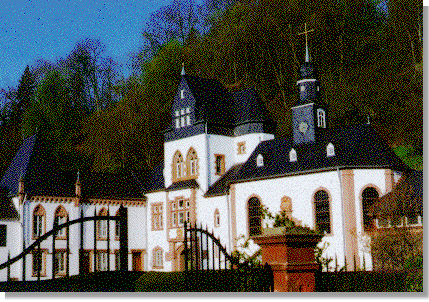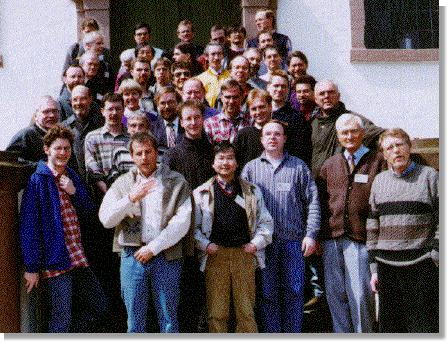Dagstuhl Seminar on
Computability and Complexity in Analysis 1997
The Seminar 9717 on Computability and Complexity in Analysis
at Schloß Dagstuhl has been organized
by
Ker-I Ko (New York),
Anil Nerode (Cornell),
Klaus Weihrauch (Hagen).
It took place at
Schloß Dagstuhl,
Wadern, Germany, April 21-25, 1997.

Motivation
The concept of computability in analysis and the theory of computable
analysis have been investigated and developed since Turing's paper of
1936 "On computable numbers..." introduced his famous machine model
as well as the notion of computable real numbers.
In contrast to the discrete computability theory where the famous
Church-Turing thesis was almost universally accepted, there are several
non-equivalent models or approaches for investigating aspects of effectivity
in analysis existing today. None of them, however, has been accepted by
the majority of mathematicians or computer scientists. Computable Analysis
is not yet well developed. Without any doubt, this is a very important
and rich field for future research.
The first part of the seminar is intended for contributions (preferably
surveys for non-specialists) on various approaches for modelling and
investigating effectivity in analysis. We expect a very fruitful exchange
of ideas and an intensive discussion on models.
In the second part advanced results on computability and computational
complexity in analysis shall be reported and discussed, particularly work
based on Grzegorczyk's definition of computable real functions.
Participants

-
Götz Alefeld,
Universität Karlsruhe,
Institut für Angewandte Mathematik,
Germany
-
Mauricio Alvarez-Manilla,
Imperial College,
Department of Computing,
London,
Great Britain
-
Markus Bläser,
Universität Bonn,
Institut für Informatik II,
Römerstraße 164,
Bonn,
Germany
-
Jens Blanck,
University of Uppsala,
Department of Mathematics,
Uppsala,
Sweden
-
Paolo Boldi,
Universitá degli Studi di Milano,
Dip. Scienze dell' Informazione,
Milano, Italy
-
Vasco Brattka,
FernUniversität Hagen,
Theoretische Informatik I,
Hagen,
Germany
-
Douglas Bridges,
University of Waikato,
Dept. of Mathematics,
Hamilton,
New Zealand
-
Cristian S. Calude,
The University of Auckland,
Computer Science Department,
Auckland,
New Zealand
-
Douglas Cenzer,
University of Florida,
Department of Mathematics,
USA
-
Abbas Edalat,
Imperial College of Science,
Department of Computing,
London,
Great Britain
-
Henning Fernau,
Universität Tübingen,
Wilhelm- Schickard- Institut für Informatik,
Tübingen,
Germany
-
Xiaolin Ge,
ANASAZI Inc.,
Phoenix,
USA
-
Armin Hemmerling,
Universität Greifswald,
Institut für Mathematik und Informatik,
Germany
-
Peter Hertling,
The University of Auckland,
Computer Science Department,
New Zealand
-
Günter Hotz,
Universität des Saarlandes,
Fachbereich 14 - Informatik,
Saarbrücken
Germany
-
Jörg Hudelmaier,
Universität Tübingen,
Wilhelm-Schickard-Institut für Informatik,
Germany
-
Hajime Ishihara,
Japan Advanced Institute of
Science and Technology,
School of Information Science,
Ishikawa,
Japan
-
Bruce M. Kapron,
University of Victoria,
Department of Computer Science,
Canada
-
Julia Knight,
University of Notre Dame,
Department of Mathematics,
USA
-
Ker-I Ko,
SUNY at Stony Brook,
Dept. of Computer Science,
USA
-
Ulrich Kulisch,
Universität Karlsruhe,
Institut für Angewandte Mathematik,
Germany
-
André Lieutier,
MATRA Datavision,
Aix en Provence,
France
-
Leonid Lisovik,
Kiev National University,
Ukraine
-
Toby Moth,
Imperial College of Science,
Department of Computing,
London,
Great Britain
-
Norbert Müller,
Universität Trier,
Fachbereich IV - Informatik,
Germany
-
Anil Nerode,
Cornell University,
Mathematical Science Institute,
Ithaca,
USA
-
Erich Novak,
Universität Erlangen,
Mathematisches Institut,
Germany
-
Martin Pfeiffle,
Seewald,
Germany
-
Marian Pour-El,
University of Minnesota,
School of Mathematics,
Minneapolis,
USA
-
Philipp Sünderhauf,
Imperial College of Science,
Department of Computing,
London,
Great Britain
-
Matthias Schröder,
FernUniversität Hagen,
Theoretische Informatik I,
Germany
-
John C. Shepherdson,
Bristol University,
School of Mathematics,
Great Britain
-
Ludwig Staiger,
Universität Halle,
Inst. für Informatik,
Germany
-
Viggo Stoltenberg-Hansen,
University of Uppsala,
Department of Mathematics,
Sweden
-
John V. Tucker,
University of Swansea,
Computer Science Department,
Great Britain
-
Sebastiano Vigna,
Universitá degli Studi di Milano
Dip. Scienze dell' Informazione,
Italy
-
Klaus Weihrauch,
Fernuniversität Hagen,
Theoretische Informatik I,
Hagen,
Germany
-
Jirí Wiedermann,
Academy of Science of the Czech Republic,
Institute of Computer Science,
Prague,
Czech Republic
-
Henryk Wozniakowski,
Columbia University,
Computer Science Department,
New York,
USA
-
Peter Zahn,
TH Darmstadt,
FB 4 Mathematik,
Darmstadt,
Germany
-
Xizhong Zheng,
FernUniversität Hagen,
Theoretische Informatik I,
Germany
-
Ning Zhong,
University of Connecticut,
Department of Mathematics,
USA
-
Ugo de Ligouro,
Universitá di Torino
Dipartimento di Informatica,
Italy
|



